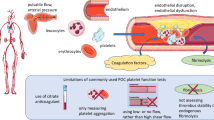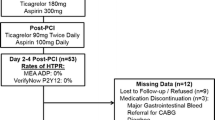Abstract
Objective: To evaluate a newly modified rapid platelet function analysis system (ICHOR/ Plateletworks®) and to compare the results obtained with those of traditional light transmission aggregometry (LTA), and the Ultegra/RPFA® system.
Background: Anti-platelet therapy is standard of care for patients as an adjunct to percutaneous coronary intervention (PCI) or for medical management of non-ST elevation acute coronary syndromes (NSTE ACS). Recent clinical trial results suggest that the three currently approved platelet GPIIb-IIIa receptor antagonists, eptifibatide, tirofiban and abciximab, may vary in extent of inhibition of platelet aggregation (IPA) at the approved doses. Thus, pharmacodynamic evaluations of these agents to determine the extent of platelet function inhibition, especially during the periprocedural time of a cardiac intervention, are necessary. A rapid measurement method as a surrogate for LTA, the current gold standard, would be ideal in order to have the option for dose monitoring or adjustment prior to or during an intervention. The Helena ICHOR/ Plateletworks® may be useful for point of care testing.
Methods: Blood samples collected in D-Phe-Pro-Arg-chloromethyl ketone dihydrochloride (PPACK) anticoagulant were treated with increasing concentrations of eptifibatide, tirofiban or abciximab. LTA was carried out in conjunction with the ICHOR/Plateletworks®, using a modified method, and Accumetrics Ultegra® with RPFA cartridges.
Results: This study demonstrated that platelet inhibition measured by the ICHOR/Plateletworks® mirrored the level of IPA obtained with LTA. In contrast, the Ultegra® system had less correlation when compared to LTA at inhibition levels < 90%.
Conclusions: Based on these data, the ICHOR/ Plateletworks® utilized under modified guidelines may serve as a surrogate for LTA when rapid measurements are necessary.
Abbreviated Abstract
A rapid platelet function measurement method as a surrogate for light transmission aggregometry (LTA), the current gold standard, is ideal in order to have the option for GPIIb-IIIa antagonist dose monitoring or adjustment prior to or during a coronary intervention. A newly modified rapid platelet function analysis system (ICHOR/Plateletworks® was evaluated and compared to the results obtained with traditional light transmission aggregometry (LTA), and the Ultegra/RPFA® system. Blood samples collected in D-Phe-Pro-Arg-chloromethyl ketone dihydrochloride (PPACK) anticoagulant were treated with increasing concentrations of eptifibatide, tirofiban or abciximab. LTA was carried out in conjunction with the ICHOR/Plateletworks®, using a modified method, and Accumetrics Ultegra® with RPFA cartridges. Based on these data, the ICHOR/Plateletworks® utilized under modified guidelines may serve as a surrogate for LTA when rapid measurements are necessary.
Similar content being viewed by others
References
Kandzari DE, Califf RM. TARGET versus GUSTO-IV: Appropriate use of glycoprotein IIb/IIIa inhibitors in acute coronary syndromes and percutaneous coronary intervention. Curr Opin Cardiol 2002;17:332–339.
Jennings LK. Clinical trials of the parenteral glycoprotein IIb-IIIa inhibitors: The influence of dose selection on results. A CME Booklet, Health Science Communication, 2001.
Gold HK, Coller BS, Yasuda T, et al. Rapid and sustained coronary artery recanalization with combined bolus injection of recombinant tissue-type plasminogen activator and monoclonal antiplatelet GPIIb/IIIa antibody in a canine preparation. Circulation 1988;77:670–677.
The EPIC Investigators. Use of a monoclonal antibody directed against the platelet glycoprotein IIb/IIIa receptor in high-risk coronary angioplasty. N Engl J Med 1994;330:956–961.
Steinhubl SR, Talley JD, Braden GA, et al. Point-of-Care measured platelet inhibition correlates with a reduced risk of an adverse cardiac event after percutaneous coronary intervention. Circulation 2001;103:2572–2578.
Jennings LK, White MM. Expression of ligand-induced binding sites on glycoprotein IIb/IIIa complexes and the effect of various inhibitors. Am Heart J 1998;135:S179–83.
Kereiakes DJ, Broderick TM, Roth EM, et al. Time course, magnitude and consistency of platelet inhibition by abciximab, tirofiban, or eptifibatide in patients with unstable angina pectoris undergoing percutaneous coronary intervention. Am J Cardiol 1999;84:391–395.
Simon DI, Liu CB, Ganz P, et al. A comparative study of light transmission aggregometry and automated bedside platelet function assay in patients undergoing percutaneous coronary intervention and receiving abciximab, eptifibatide, or tirofiban. Cathet and Cardiovasc Intervent 2001;52:425–432.
Wheeler GL, Braden GA, Steinhubl SR, et al. The Ultegra rapid platelet-function assay: Comparison to standard platelet function assays in patients undergoing percutaneous coronary intervention with abciximab therapy. Am Heart J 2002;143:602–611.
Lakkis NM, George S, Thomas E, Ali M, Guyer K, Carville D. Use of ICHOR-Platelet works to assess platelet function in patients treated with GP IIb/IIIa inhibitors. Cathet and Cardiovasc Intervent 2001;53:346–351.
Nannizzi-Alaimo L, Alves VL, Prasad KS, Stockett DE, Phillips DR. GPIIb-IIIa antagonists demonstrate a dose-dependent inhibition and potentiation of soluble CD40L (CD154) release during platelet stimulation. Circulation 2001;104(suppl II):II-318. Abstract No. 1533.
Andre P, Nannizzi-Alaimo L, Srinivasa K, Prasad KS, Philips DR. Platelet-derived CD40L: The switch-hitting player of cardiovascular disease. Circulation 2002;106:896–899.
Jennings LK, Jacoski MV, White MM. The pharmacodynamics of parenteral glycoprotein IIb/IIIa inhibitors. J Interv Cardiol 2002 Feb;15(1):45–60, Review 10.
Phillips DR, Teng WS, Arfsten A, et al. Effect of Ca++ on Integrilin™ GPIIb-IIIa interactions: Enhanced GPIIb-IIIa binding and inhibition of platelet aggregation by reductions in the concentration of ionized calcium in plasma anticoagulated with citrate. Circulation 1997;96:1488–1494.
Li CK, Hoffmann TJ, Hsieh PY, Malik S, Watson WC. The Xylum Clot Signature Analyzer: A dynamic flow system that simulates vascular injury. Thromb Res 1998;92:S67–S77.
Madan M, Berkowitz SD, Christie DJ, et al. Rapid assessment of glycoprotein IIb-IIIa blockade using the platelet function analyzer (PFA-100) during percutaneous coronary intervention. Am Heart J 2001;141(2):226–233.
Nannizzi-Alaimo L, Rychel AL, Teng W, et al. Effect of citrate anticoagulation and platelet agonist concentration on the inhibitory activities of GPIIb-IIIa antagonists. Circulation 1999;100:1710.
Kereiakes DJ, Lorenz TJ, Young JJ, et al. Differential effects of citrate versus PPACK anticoagulation on measured platelet inhibition by abciximab, eptifibatide and tirofiban. J Thromb Thrombolysis 2001;12:123–127.
Coller BS, Lang D, Scudder LE. Rapid and simple platelet function assay to assess glycoprotein IIb/IIIa receptor blockade. Circulation 1997;95:860–867.
The PURSUIT Trial Investigators. Inhibition of platelet glycoprotein IIb/IIIa with eptifibatide in patients with acute coronary syndromes. N Engl J Med 1998;339:436–443.
Simoons ML, and the GUSTO IV-ACS Investigators. Effect of glycoprotein IIb/IIIa receptor blocker abciximab on outcome in patients with acute coronary syndromes without early coronary revascularisation: The GUSTO IV-ACS randomized trial. Lancet 2001;357:1915–1924.
Saucedo JF, Lui HK, Garza L, Guerra GJ, Jacoski MV, Jennings LK. Comparative pharmacodynamic evaluation of eptifibatide and abciximab in patients with non-ST-segment elevation acute coronary syndromes: The TAM2 Study. J Thromb Thrombolysis, 2004(in press).
Quinn MJ, Plow EF, Topol EJ. Platelet glycoprotein IIb/IIIa inhibitors: Recognition of a two-edged sword? Circulation 2002;106:379–385.
Author information
Authors and Affiliations
Corresponding author
Additional information
Supported in part by Helena Laboratories, Inc. and the University of Tennessee Health Science Center Vascular Biology Center of Excellence
Rights and permissions
About this article
Cite this article
White, M.M., Krishnan, R., Kueter, T.J. et al. The Use of the Point of Care Helena ICHOR/Plateletworks® and the Accumetrics Ultegra® RPFA for Assessment of Platelet Function with GPIIb-IIIa Antagonists. J Thromb Thrombolysis 18, 163–169 (2004). https://doi.org/10.1007/s11239-005-0341-x
Issue Date:
DOI: https://doi.org/10.1007/s11239-005-0341-x




